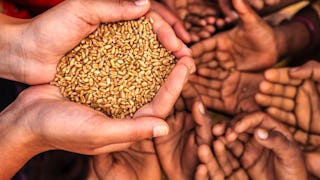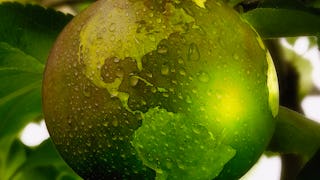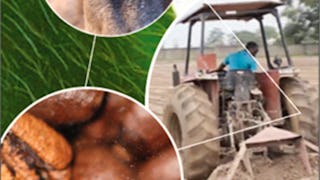This course explores the population-environment relationship. In this course, you will learn about the human population and the ways in which changes in the population affect the environment. Agriculture, soils, and the environmental implications of eating meat, vegetables, local, organic, sustainable, industrial, and other types of food are discussed too.

Ends today: Lock in Cyber Monday savings with $160 off 10,000+ programs. Save now.


Population, Food, and Soil
This course is part of Introduction to Environmental Science Specialization

Instructor: Andy Friedland
6,796 already enrolled
Included with
(54 reviews)
Recommended experience
Skills you'll gain
Details to know

Add to your LinkedIn profile
4 assignments
See how employees at top companies are mastering in-demand skills

Build your subject-matter expertise
- Learn new concepts from industry experts
- Gain a foundational understanding of a subject or tool
- Develop job-relevant skills with hands-on projects
- Earn a shareable career certificate

There are 4 modules in this course
This module explores the global population trends, how and why population changes, and concepts related to population numbers including growth rate, doubling time, crude birth and date rates etc.
What's included
4 videos13 readings1 assignment8 discussion prompts
This module explores the global population dynamics.
What's included
3 videos4 readings1 assignment4 discussion prompts
This module deals with the major environmental issues related to global human nutrition, some common practices of modern, industrial agriculture and the potential environmental costs associated with each practice. It also explores sustainable farming practices.
What's included
4 videos5 readings1 assignment5 discussion prompts
This module explores the role of soils in ecosystems, soil horizons, and soil-forming processes. Through a video, you will learn about the soils of a particular landscape and learn about various soil-forming processes.
What's included
4 videos5 readings1 assignment6 discussion prompts
Earn a career certificate
Add this credential to your LinkedIn profile, resume, or CV. Share it on social media and in your performance review.
Instructor

Offered by
Explore more from Environmental Science and Sustainability
 Status: Free
Status: FreeUtrecht University
 Status: Free Trial
Status: Free TrialStanford University
 Status: Preview
Status: PreviewUniversity of Copenhagen
 Status: Preview
Status: PreviewUniversity of Pennsylvania
Why people choose Coursera for their career




Learner reviews
54 reviews
- 5 stars
87.03%
- 4 stars
9.25%
- 3 stars
1.85%
- 2 stars
1.85%
- 1 star
0%
Showing 3 of 54
Reviewed on Jul 26, 2023
Excellently compiled and the instructor way of teaching is very good!
Reviewed on Dec 3, 2024
دورة تدريبية مذهلة !
Reviewed on Sep 20, 2024
It's wonderful to learn about the effects the human population has through agriculture, and the soil too.

Open new doors with Coursera Plus
Unlimited access to 10,000+ world-class courses, hands-on projects, and job-ready certificate programs - all included in your subscription
Advance your career with an online degree
Earn a degree from world-class universities - 100% online
Join over 3,400 global companies that choose Coursera for Business
Upskill your employees to excel in the digital economy
Frequently asked questions
To access the course materials, assignments and to earn a Certificate, you will need to purchase the Certificate experience when you enroll in a course. You can try a Free Trial instead, or apply for Financial Aid. The course may offer 'Full Course, No Certificate' instead. This option lets you see all course materials, submit required assessments, and get a final grade. This also means that you will not be able to purchase a Certificate experience.
When you enroll in the course, you get access to all of the courses in the Specialization, and you earn a certificate when you complete the work. Your electronic Certificate will be added to your Accomplishments page - from there, you can print your Certificate or add it to your LinkedIn profile.
Yes. In select learning programs, you can apply for financial aid or a scholarship if you can’t afford the enrollment fee. If fin aid or scholarship is available for your learning program selection, you’ll find a link to apply on the description page.
More questions
Financial aid available,

